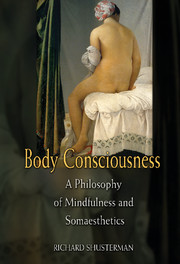Book contents
- Frontmatter
- Contents
- Preface
- Introduction
- 1 Somaesthetics and Care of the Self: The Case of Foucault
- 2 The Silent, Limping Body of Philosophy: Somatic Attention Deficit in Merleau-Ponty
- 3 Somatic Subjectivities and Somatic Subjugation: Simone de Beauvoir on Gender and Aging
- 4 Wittgenstein's Somaesthetics: Explanation and Melioration in Philosophy of Mind, Art, and Politics
- 5 Deeper into the Storm Center: The Somatic Philosophy of William James
- 6 Redeeming Somatic Reflection: John Dewey's Philosophy of Body-Mind
- Select Bibliography
- Index
2 - The Silent, Limping Body of Philosophy: Somatic Attention Deficit in Merleau-Ponty
Published online by Cambridge University Press: 05 June 2012
- Frontmatter
- Contents
- Preface
- Introduction
- 1 Somaesthetics and Care of the Self: The Case of Foucault
- 2 The Silent, Limping Body of Philosophy: Somatic Attention Deficit in Merleau-Ponty
- 3 Somatic Subjectivities and Somatic Subjugation: Simone de Beauvoir on Gender and Aging
- 4 Wittgenstein's Somaesthetics: Explanation and Melioration in Philosophy of Mind, Art, and Politics
- 5 Deeper into the Storm Center: The Somatic Philosophy of William James
- 6 Redeeming Somatic Reflection: John Dewey's Philosophy of Body-Mind
- Select Bibliography
- Index
Summary
In the field of Western philosophy, Maurice Merleau-Ponty is something like the patron saint of the body. Though La Mettrie, Diderot, Nietzsche, and Foucault have also passionately championed the bodily dimension of human experience, none can match the bulk of rigorous, systematic, and persistent argument that Merleau-Ponty provides to prove the body's primacy in human experience and meaning. With tireless eloquence that almost seems to conquer by its massive unrelenting flow, he insists that the body is not only the crucial source of all perception and action but also the core of our expressive capability and thus the ground of all language and meaning.
Paradoxically, while celebrating the body's role in expression, Merleau-Ponty typically characterizes it in terms of silence. The body, he writes in Phenomenology of Perception, constitutes “the tacit cogito,” “the silent cogito,” the “unspoken cogito.” As our “primary subjectivity,” it is “the consciousness which conditions language,” but itself remains a “silent consciousness” with an “inarticulate grasp upon the world” (PoP, 402–404). Forming “the background of silence” that is necessary for language to emerge, the body, as gesture, is also already “a tacit language” and the ground of all expression: “every human use of the body is already primordial expression” (S, 46–47, 67). There is a further paradox. Though surpassing other philosophers in emphasizing the body's expressive role, Merleau-Ponty hardly wants to listen to what the body seems to say about itself in terms of its self-conscious sensations, such as explicit kinaesthetic or proprioceptive feelings.
- Type
- Chapter
- Information
- Body ConsciousnessA Philosophy of Mindfulness and Somaesthetics, pp. 49 - 76Publisher: Cambridge University PressPrint publication year: 2008



